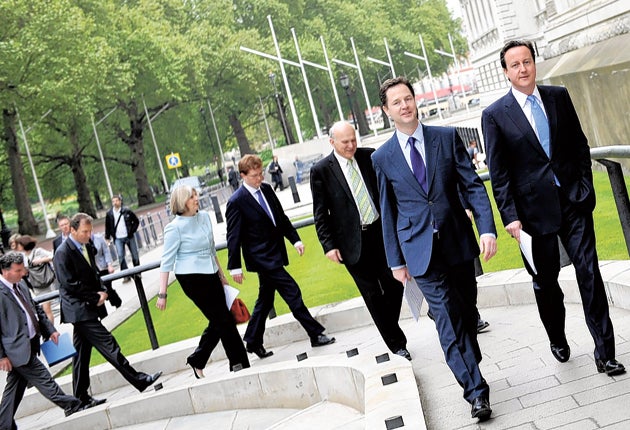Outcry by backbenchers at Cameron's 1922 coup

Your support helps us to tell the story
From reproductive rights to climate change to Big Tech, The Independent is on the ground when the story is developing. Whether it's investigating the financials of Elon Musk's pro-Trump PAC or producing our latest documentary, 'The A Word', which shines a light on the American women fighting for reproductive rights, we know how important it is to parse out the facts from the messaging.
At such a critical moment in US history, we need reporters on the ground. Your donation allows us to keep sending journalists to speak to both sides of the story.
The Independent is trusted by Americans across the entire political spectrum. And unlike many other quality news outlets, we choose not to lock Americans out of our reporting and analysis with paywalls. We believe quality journalism should be available to everyone, paid for by those who can afford it.
Your support makes all the difference.Angry Conservative MPs are threatening a legal challenge to a move to open their powerful backbench committee to Government ministers.
In an early sign of discontent among David Cameron's foot soldiers, the measure was only passed by 168 to 118 votes. The Tory leader had to call on his "payroll vote" of 78 ministers to swing the vote, and some MPs complained that whips had watched them as they cast their ballots.
His internal critics, who suspect that the Prime Minister is trying to silence the Tory Right, likened his plans to Robert Mugabe's attempts to crush resistance in Zimbabwe.
Membership of the 1922 Committee has traditionally been limited to backbenchers when the Conservatives are in power. MPs have regarded it as a powerful vehicle for conveying their grievances to ministers.
Mr Cameron, who already faces resentment among some of his MPs over the terms of the coalition deal with the Liberal Democrats, argues that the change is essential for maintaining party unity. He sprang the proposed change on his party at a meeting of MPs on Wednesday night, and asked them to approve it in a vote that closed yesterday morning.
Mr Cameron's relatively narrow margin of victory underlined the depth of hostility to the move. As 20 of the 306 Tory MPs did not vote, less than 55 per cent of the parliamentary party (including the ministers) – and a minority of backbenchers – approved the change.
It will mean the "payroll vote" will be able to take part in the election of the committee's new chairman next week, to be fought between Graham Brady, who has warned the leadership not to take MPs for granted, and Richard Ottaway, who is regarded as a loyalist.
Last night the former minister Christopher Chope said he was consulting lawyers about the rule change, while other MPs were said to be planning to set up a breakaway backbenchers-only committee.
They argued that giving ministers full speaking and voting rights in the 1922 Committee was equivalent to proscribing it. Bill Cash, the MP for Stone, said: "The independence of backbenchers within the House of Commons, and within the 1922 Committee, has to be the prime consideration. Nothing should be done to interfere with their independence of judgement." Peter Bone, MP for Wellingborough, said: "I was upset at the speed at which it was done. I think it was a mistake."
The former MP Paul Goodman, writing on the ConservativeHome website, said: "A week ago, Cameron retained the goodwill of most of his MPs, despite failing to win the election outright and forming a coalition with an opposing party – on what many of them regarded as dubious terms. However, much of that goodwill has vanished since yesterday afternoon."
Mr Cameron denied he was "picking a fight" with his backbenchers by changing the committee's rules.
"I think it is much better to have one organisation in the party which has one mind and, to coin a phrase, we are all in it together," he said. George Osborne, the Chancellor, said: "The idea is this – that we behave and act as a single party, front bench and back bench." Party officials dismissed the prospect of a legal challenge. They said the committee's rules had been changed in the same way when Winston Churchill led a coalition government during the Second World War.
Meanwhile, Mr Cameron faces a show of defiance from his benches over his plans to impose a threshold of a vote of 55 per cent of MPs for Parliament to be dissolved before the end of its fixed five-year term. A debate will take place on Tuesday on the controversial plans, which have already been denounced by MPs of all parties.
Other Tories have protested over their leadership's decision to abandon its promise to abolish the Human Rights Act. Anger is also growing over suggestions that the coalition could adopt Liberal Democrat proposals to increase capital gains tax.
Join our commenting forum
Join thought-provoking conversations, follow other Independent readers and see their replies
Comments